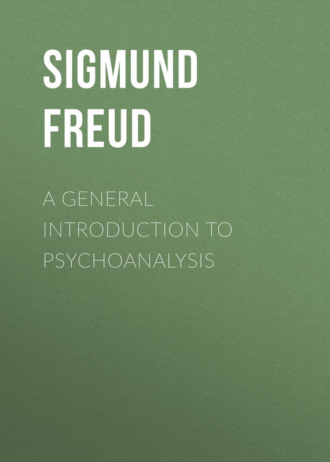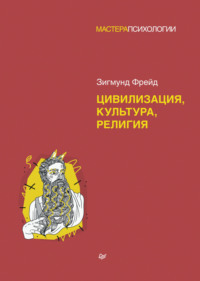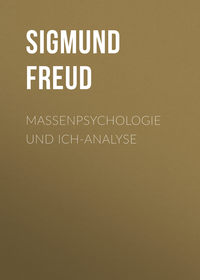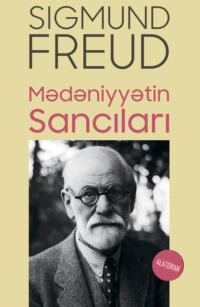 полная версия
полная версияA General Introduction to Psychoanalysis
In our second patient we meet with fundamentally the same thing. She had created a decree which she must follow: the pillow must not touch the head of the bed; yet she does not know how it originated, what its meaning is, nor to what motive it owes the source of its power. It is immaterial whether she looks upon it with indifference or struggles against it, storms against it, determines to overcome it. She must nevertheless follow it and carry out its ordinance, though she asks herself, in vain, why. One must admit that these symptoms of compulsion neurosis offer the clearest evidence for a special sphere of psychological activity, cut off from the rest. What else could be back of these images and impulses, which appear from one knows not where, which have such great resistance to all the influences of an otherwise normal psychic life; which give the patient himself the impression that here are super-powerful guests from another world, immortals mixing in the affairs of mortals. Neurotic symptoms lead unmistakably to a conviction of the existence of an unconscious psychology, and for that very reason clinical psychiatry, which recognizes only a conscious psychology, has no explanation other than that they are present as indications of a particular kind of degeneration. To be sure, the compulsive images and impulses are not themselves unconscious – no more so than the carrying out of the compulsive-acts escapes conscious observation. They would not have been symptoms had they not penetrated through into consciousness. But their psychological antecedents as disclosed by the analysis, the associations into which we place them by our interpretations, are unconscious, at least until we have made them known to the patient during the course of the analysis.
Consider now, in addition, that the facts established in our two cases are confirmed in all the symptoms of all neurotic diseases, that always and everywhere the meaning of the symptoms is unknown to the sufferer, that analysis shows without fail that these symptoms are derivatives of unconscious experiences which can, under various favorable conditions, become conscious. You will understand then that in psychoanalysis we cannot do without this unconscious psyche, and are accustomed to deal with it as with something tangible. Perhaps you will also be able to understand how those who know the unconscious only as an idea, who have never analyzed, never interpreted dreams, or never translated neurotic symptoms into meaning and purpose, are most ill-suited to pass an opinion on this subject. Let us express our point of view once more. Our ability to give meaning to neurotic symptoms by means of analytic interpretation is an irrefutable indication of the existence of unconscious psychological processes – or, if you prefer, an irrefutable proof of the necessity for their assumption.
But that is not all. Thanks to a second discovery of Breuer's, for which he alone deserves credit and which appears to me to be even more far-reaching, we are able to learn still more concerning the relationship between the unconscious and the neurotic symptom. Not alone is the meaning of the symptoms invariably hidden in the unconscious; but the very existence of the symptom is conditioned by its relation to this unconscious. You will soon understand me. With Breuer I maintain the following: Every time we hit upon a symptom we may conclude that the patient cherishes definite unconscious experiences which withhold the meaning of the symptoms. Vice versa, in order that the symptoms may come into being, it is also essential that this meaning be unconscious. Symptoms are not built up out of conscious experiences; as soon as the unconscious processes in question become conscious, the symptom disappears. You will at once recognize here the approach to our therapy, a way to make symptoms disappear. It was by these means that Breuer actually achieved the recovery of his patient, that is, freed her of her symptoms; he found a technique for bringing into her consciousness the unconscious experiences that carried the meaning of her symptoms, and the symptoms disappeared.
This discovery of Breuer's was not the result of a speculation, but of a felicitous observation made possible by the coöperation of the patient. You should therefore not trouble yourself to find things you already know to which you can compare these occurrences, rather you should recognize herein a new fundamental fact which in itself is capable of much wider application. Toward this further end permit me to go over this ground again in a different way.
The symptom develops as a substitution for something else that has remained suppressed. Certain psychological experiences should normally have become so far elaborated that consciousness would have attained knowledge of them. This did not take place, however, but out of these interrupted and disturbed processes, imprisoned in the unconscious, the symptom arose. That is to say, something in the nature of an interchange had been effected; as often as therapeutic measures are successful in again reversing this transposition, psychoanalytic therapy solves the problem of the neurotic symptom.
Accordingly, Breuer's discovery still remains the foundation of psychoanalytic therapy. The assertion that the symptoms disappear when one has made their unconscious connections conscious, has been borne out by all subsequent research, although the most extraordinary and unexpected complications have been met with in its practical execution. Our therapy does its work by means of changing the unconscious into the conscious, and is effective only in so far as it has the opportunity of bringing about this transformation.
Now we shall make a hasty digression so that you do not by any chance imagine that this therapeutic work is too easy. From all we have learned so far, the neurosis would appear as the result of a sort of ignorance, the incognizance of psychological processes that we should know of. We would thus very closely approximate the well-known Socratic teachings, according to which evil itself is the result of ignorance. Now the experienced physician will, as a rule, discover fairly readily what psychic impulses in his several patients have remained unconscious. Accordingly it would seem easy for him to cure the patient by imparting this knowledge to him and freeing him of his ignorance. At least the part played by the unconscious meaning of the symptoms could easily be discovered in this manner, and it would only be in dealing with the relationship of the symptoms to the experiences of the patient that the physician would be handicapped. In the face of these experiences, of course, he is the ignorant one of the two, for he did not go through these experiences, and must wait until the patient remembers them and tells them to him. But in many cases this difficulty could be readily overcome. One can question the relatives of the patient concerning these experiences, and they will often be in a position to point out those that carry any traumatic significance; they may even be able to inform the analyst of experiences of which the patient knows nothing because they occurred in the very early years of his life. By a combination of such means it would seem that the pathogenic ignorance of the patient could be cleared up in a short time and without much trouble.
If only that were all! We have made discoveries for which we were at first unprepared. Knowing and knowing is not always the same thing; there are various kinds of knowing that are psychologically by no means comparable. "Il y a fagots et fagots,"39 as Molière says. The knowledge of the physician is not the same as that of the patient and cannot bring about the same results. The physician can gain no results by transferring his knowledge to the patient in so many words. This is perhaps putting it incorrectly, for though the transference does not result in dissolving the symptoms, it does set the analysis in motion, and calls out an energetic denial, the first sign usually that this has taken place. The patient has learned something that he did not know up to that time, the meaning of his symptoms, and yet he knows it as little as before. So we discover there is more than one kind of ignorance. It will require a deepening of our psychological insight to make clear to us wherein the difference lies. But our assertion nevertheless remains true that the symptoms disappear with the knowledge of their meaning. For there is only one limiting condition; the knowledge must be founded on an inner change in the patient which can be attained only through psychic labors directed toward a definite end. We have here been confronted by problems which will soon lead us to the elaboration of a dynamics of symptom formation.
I must stop to ask you whether this is not all too vague and too complicated? Do I not confuse you by so often retracting my words and restricting them, spinning out trains of thought and then rejecting them? I should be sorry if this were the case. However, I strongly dislike simplification at the expense of truth, and am not averse to having you receive the full impression of how many-sided and complicated the subject is. I also think that there is no harm done if I say more on every point than you can at the moment make use of. I know that every hearer and reader arranges what is offered him in his own thoughts, shortens it, simplifies it and extracts what he wishes to retain. Within a given measure it is true that the more we begin with the more we have left. Let me hope that, despite all the by-play, you have clearly grasped the essential parts of my remarks, those about the meaning of symptoms, about the unconscious, and the relation between the two. You probably have also understood that our further efforts are to take two directions: first, the clinical problem – to discover how persons become sick, how they later on accomplish a neurotic adaptation toward life; secondly, a problem of psychic dynamics, the evolution of the neurotic symptoms themselves from the prerequisites of the neuroses. We will undoubtedly somewhere come on a point of contact for these two problems.
I do not wish to go any further to-day, but since our time is not yet up I intend to call your attention to another characteristic of our two analyses, namely, the memory gaps or amnesias, whose full appreciation will be possible later. You have heard that it is possible to express the object of psychoanalytic treatment in a formula: all pathogenic unconscious experience must be transposed into consciousness. You will perhaps be surprised to learn that this formula can be replaced by another: all the memory gaps of the patient must be filled out, his amnesias must be abolished. Practically this amounts to the same thing. Therefore an important role in the development of his symptoms must be accredited to the amnesias of the neurotic. The analysis of our first case, however, will hardly justify this valuation of the amnesia. The patient has not forgotten the scene from which the compulsion act derives – on the contrary, she remembers it vividly, nor is there any other forgotten factor which comes into play in the development of these symptoms. Less clear, but entirely analogous, is the situation in the case of our second patient, the girl with the compulsive ritual. She, too, has not really forgotten the behavior of her early years, the fact that she insisted that the door between her bedroom and that of her parents be kept open, and that she banished her mother out of her place in her parents' bed. She recalls all this very clearly, although hesitatingly and unwillingly. Only one factor stands out strikingly in our first case, that though the patient carries out her compulsive act innumerable times, she is not once reminded of its similarity with the experience after the bridal-night; nor was this memory even suggested when by direct questions she was asked to search for its motivation. The same is true of the girl, for in her case not only her ritual, but the situation which provoked it, is repeated identically night after night. In neither case is there any actual amnesia, no lapse of memory, but an association is broken off which should have called out a reproduction, a revival in the memory. Such a disturbance is enough to bring on a compulsion neurosis. Hysteria, however, shows a different picture, for it is usually characterized by most grandiose amnesias. As a rule, in the analysis of each hysterical symptom, one is led back to a whole chain of impressions which, upon their recovery, are expressly designated as forgotten up to the moment. On the one hand this chain extends back to the earliest years of life, so that the hysterical amnesias may be regarded as the direct continuation of the infantile amnesias, which hides the beginnings of our psychic life from those of us who are normal. On the other hand, we discover with surprise that the most recent experiences of the patient are blurred by these losses of memory – that especially the provocations which favored or brought on the illness are, if not entirely wiped out by the amnesia, at least partially obliterated. Without fail important details have disappeared from the general picture of such a recent memory, or are placed by false memories. Indeed it happens almost regularly that just before the completion of an analysis, certain memories of recent experiences suddenly come to light. They had been held back all this time, and had left noticeable gaps in the context.
We have pointed out that such a crippling of the ability to recall is characteristic of hysteria. In hysteria symptomatic conditions also arise (hysterical attacks) which need leave no trace in the memory. If these things do not occur in compulsion-neuroses, you are justified in concluding that these amnesias exhibit psychological characteristics of the hysterical change, and not a general trait of the neuroses. The significance of this difference will be more closely limited by the following observations. We have combined two things as the meaning of a symptom, its "whence," on the one hand, and its "whither" or "why," on the other. By these we mean to indicate the impressions and experiences whence the symptom arises, and the purpose the symptom serves. The "whence" of a symptom is traced back to impressions which have come from without, which have therefore necessarily been conscious at some time, but which may have sunk into the unconscious – that is, have been forgotten. The "why" of the symptom, its tendency, is in every case an endopsychic process, developed from within, which may or may not have become conscious at first, but could just as readily never have entered consciousness at all and have been unconscious from its inception. It is, after all, not so very significant that, as happens in the hysterias, amnesia has covered over the "whence" of the symptom, the experience upon which it is based; for it is the "why," the tendency of the symptom, which establishes its dependence on the unconscious, and indeed no less so in the compulsion neuroses than in hysteria. In both cases the "why" may have been unconscious from the very first.
By thus bringing into prominence the unconscious in psychic life, we have raised the most evil spirits of criticism against psychoanalysis. Do not be surprised at this, and do not believe that the opposition is directed only against the difficulties offered by the conception of the unconscious or against the relative inaccessibility of the experiences which represent it. I believe it comes from another source. Humanity, in the course of time, has had to endure from the hands of science two great outrages against its naive self-love. The first was when humanity discovered that our earth was not the center of the universe, but only a tiny speck in a world-system hardly conceivable in its magnitude. This is associated in our minds with the name "Copernicus," although Alexandrian science had taught much the same thing. The second occurred when biological research robbed man of his apparent superiority under special creation, and rebuked him with his descent from the animal kingdom, and his ineradicable animal nature. This re-valuation, under the influence of Charles Darwin, Wallace and their predecessors, was not accomplished without the most violent opposition of their contemporaries. But the third and most irritating insult is flung at the human mania of greatness by present-day psychological research, which wants to prove to the "I" that it is not even master in its own home, but is dependent upon the most scanty information concerning all that goes on unconsciously in its psychic life. We psychoanalysts were neither the first, nor the only ones to announce this admonition to look within ourselves. It appears that we are fated to represent it most insistently and to confirm it by means of empirical data which are of importance to every single person. This is the reason for the widespread revolt against our science, the omission of all considerations of academic urbanity, and emancipation of the opposition from all restraints of impartial logic. We were compelled to disturb the peace of the world, in addition, in another manner, of which you will soon come to know.
NINETEENTH LECTURE
GENERAL THEORY OF THE NEUROSES
Resistance and SuppressionIN order to progress in our understanding of the neuroses, we need new experiences and we are about to obtain two. Both are very remarkable and were at the time of their discovery, very surprising. You are, of course, prepared for both from our discussions of the past semester.
In the first place: When we undertake to cure a patient, to free him from the symptoms of his malady, he confronts us with a vigorous, tenacious resistance that lasts during the whole time of the treatment. That is so peculiar a fact that we cannot expect much credence for it. The best thing is not to mention this fact to the patient's relatives, for they never think of it otherwise than as a subterfuge on our part in order to excuse the length or the failure of our treatment. The patient, moreover, produces all the phenomena of this resistance without even recognizing it as such; it is always a great advance to have brought him to the point of understanding this conception and reckoning with it. Just consider, this patient suffers from his symptoms and causes those about him to suffer with him. He is willing, moreover, to take upon himself so many sacrifices of time, money, effort and self-denial in order to be freed. And yet he struggles, in the very interests of his malady, against one who would help him. How improbable this assertion must sound! And yet it is so, and if we are reproached with its improbability, we need only answer that this fact is not without its analogies. Whoever goes to a dentist with an unbearable toothache may very well find himself thrusting away the dentist's arm when the man makes for his sick tooth with a pair of pincers.
The resistance which the patient shows is highly varied, exceedingly subtle, often difficult to recognize, Protean-like in its manifold changes of form. It means that the doctor must become suspicious and be constantly on his guard against the patient. In psychoanalytic therapy we make use, as you know, of that technique which is already familiar to you from the interpretation of dreams. We tell the patient that without further reflection he should put himself into a condition of calm self-observation and that he must then communicate whatever results this introspection gives him – feelings, thoughts, reminiscences, in the order in which they appear to his mind. At the same time, we warn him expressly against yielding to any motive which would induce him to choose or exclude any of his thoughts as they arise, in whatever way the motive may be couched and however it may excuse him from telling us the thought: "that is too unpleasant," or "too indiscreet" for him to tell; or "it is too unimportant," or "it does not belong here," "it is nonsensical." We impress upon him the fact that he must skim only across the surface of his consciousness and must drop the last vestige of a critical attitude toward that which he finds. We finally inform him that the result of the treatment and above all its length is dependent on the conscientiousness with which he follows this basic rule of the analytic technique. We know, in fact, from the technique of interpreting dreams, that of all the random notions which may occur, those against which such doubts are raised are invariably the ones to yield the material which leads to the uncovering of the unconscious.
The first reaction we call out by laying down this basic technical rule is that the patient directs his entire resistance against it. The patient tries in every way to escape its requirements. First he will declare that he cannot think of anything, then, that so much comes to his mind that it is impossible to seize on anything definite. Then we discover with no slight displeasure that he has yielded to this or that critical objection, for he betrays himself by the long pauses which he allows to occur in his speaking. He then confesses that he really cannot bring himself to this, that he is ashamed to; he prefers to let this motive get the upper hand over his promise. He may say that he did think of something but that it concerns someone else and is for that reason exempt. Or he says that what he just thought of is really too trivial, too stupid and too foolish. I surely could not have meant that he should take such thoughts into account. Thus it goes on, with untold variations, in the face of which we continually reiterate that "telling everything" really means telling everything.
One can scarcely find a patient who does not make the attempt to reserve some province for himself against the intrusion of the analysis. One patient, whom I must reckon among the most highly intelligent, thus concealed an intimate love relation for weeks; and when he was asked to explain this infringement of our inviolable rule, he defended his action with the argument that he considered this one thing was his private affair. Naturally, analytic treatment cannot countenance such right of sanctuary. One might as well try in a city like Vienna to allow an exception to be made of great public squares like the Hohe Markt or the Stephans Platz and say that no one should be arrested in those places – and then attempt to round up some particular wrong-doer. He will be found nowhere but in those sanctuaries. I once brought myself around to permit such an exception in the case of a man on whose capacity for work a great deal depended, and who was bound by his oath of service, which forbade him to tell anyone of certain things. To be sure, he was satisfied with the results – but not I; I resolved never to repeat such an attempt under these conditions.
Compulsion neurotics are exceedingly adept at making this technical rule almost useless by bringing to bear all their over-conscientiousness and their doubts upon it. Patients suffering from anxiety-hysteria sometimes succeed in reducing it to absurdity by producing only notions so remote from the thing sought for that analysis is quite unprofitable. But it is not my intention to go into the way in which these technical difficulties may be met. It is enough to know that finally, by means of resolution and perseverance, we do succeed in wresting a certain amount of obedience from the patient toward this basic rule of the technique; the resistance then makes itself felt in other ways. It appears in the form of an intellectual resistance, battles by means of arguments, and makes use of all difficulties and improbabilities which a normal yet uninstructed thinking is bound to find in the theory of analysis. Then we hear from one voice alone the same criticisms and objections which thunder about us in mighty chorus in the scientific literature. Therefore the critics who shout to us from outside cannot tell us anything new. It is a veritable tempest in a teapot. Still the patient can be argued with, he is anxious to persuade us to instruct him, to teach him, to lead him to the literature, so that he may continue working things out for himself. He is very ready to become an adherent of psychoanalysis on condition that analysis spare him personally. But we recognize this curiosity as a resistance, as a diversion from our special objects, and we meet it accordingly. In those patients who suffer from compulsion neuroses, we must expect the resistance to display special tactics. They frequently allow the analysis to take its way, so that it may succeed in throwing more and more light on the problems of the case, but we finally begin to wonder how it is that this clearing up brings with it no practical progress, no diminution of the symptom. Then we may discover that the resistance has entrenched itself in the doubts of the compulsion neurosis itself and in this position is able successfully to resist our efforts. The patient has said something like this to himself: "This is all very nice and interesting. And I would be glad to continue it. It would affect my malady considerably if it were true. But I don't believe that it is true and as long as I don't believe it, it has nothing to do with my sickness." And so it may go on for a long time until one finally has shaken this position itself; it is then that the decisive battle takes place.









